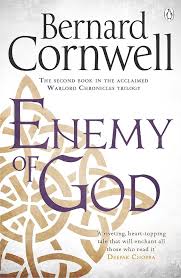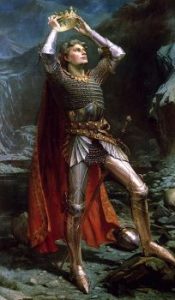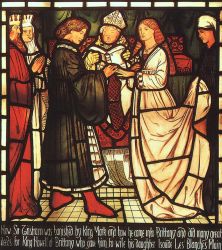
© Penguin Books
I’ve just finished Excalibur (1997), the third and final book in the Warlord Chronicles, Bernard Cornwell’s take on the King Arthur legend. Reading it was a bittersweet experience. On one hand, I was pleased it lived up to the high standards set by its predecessors in the trilogy, The Winter King (1995) and Enemy of God (1996). On the other, I felt almost reluctant to read it because I’d come to know so well, even love, the characters from the earlier two books – and this being the King Arthur legend, I was aware things wouldn’t end happily for them.
Still, not wanting to read the final book in the trilogy because you don’t want bad things to happen to its characters – that must show how captivating Cornwell’s Warlord books are. And besides, as they say, all good things come to an end.
Once again, the story is narrated by Derfel, an elderly, one-handed Christian monk. He’s writing down – with his remaining hand, obviously – the details of Arthur’s life as it unfolded in post-Roman, fifth-and-sixth-century Britain, a time when the island and its Briton inhabitants were besieged by invading, land-hungry Saxons. Derfel knows these details because despite being Christian and monkish now, he was in his youth (and, in Excalibur, his middle age) a pagan and one of Arthur’s warlords. He’s recording the story at the request of Queen Igraine, who’s too young to have known Arthur but is besotted with his legend. Derfel unhappily suspects that, when he’s finished, the queen will change the unromantic bits of his saga to make it more legend-friendly. “Tales of men fighting can get very boring after a while,” she scolds the old monk, “and a love story makes it all a lot more interesting.”
Excalibur joins the dots and tells us how Derfel went from being a powerful pagan warrior to being a humble Christian monk in a monastery run by the contemptible Bishop Sansum – a recurring character in the trilogy, who constantly schemed and shit-stirred against Arthur and, in his furtive, cowardly way, tried to engineer his downfall. We also learn how Derfel lost his hand. And, all credit to Cornwell’s ingenious storyline, he certainly doesn’t lose it in any way I’d expected.
And we find out the fates of the characters who were still standing at the end of the second book. We learn what happened to the wily and enigmatic druid Merlin; to King Cuneglas of Powys whom, alone among Britain’s powerful kings, Arthur could depend upon as an ally; and to Derfel’s fellow warriors, such as the Christian Galahad, and the Numidian Sagramor, and the coarse but likable Culhwch. Also, with an ache, Derfel recalls what became of his partner Ceinwyn. In this final volume, she has to endure a lot.
Of course, we get the final chapters in the life of Arthur himself. At one point, Derfel sums up the thanklessness of Arthur’s task: “If only Arthur had remained in power, men say, then the Saxons would still be paying us tribute and Britain would stretch from sea to sea, but when Britain did have Arthur it just grumbled about him. When he gave folk what they wanted, they complained because it was not enough. The Christians attacked him for favouring the pagans, the pagans attacked him for tolerating the Christians, and the Kings… were jealous of him… Besides, Arthur did not let anyone down. Britain let itself down. Britain let the Saxons creep back, Britain squabbled among itself and then Britain whined that it was all Arthur’s fault. Arthur, who had given them victory!”
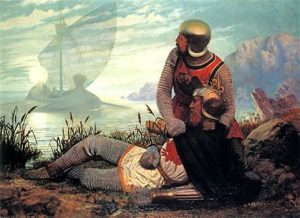
From wikimedia.org
No wonder that in Excalibur, after Arthur manages to beat off the Saxons, he retires from his role as the Lord Protector of the kingdom of Dumnonia and becomes ‘a mere landowner living in the peaceful countryside with no worries other than the health of his livestock and the state of his crops…’ He also, amusingly, tries to learn how to be a blacksmith, but he’s not very good at it. When Derfel sees him working on ‘a shapeless piece of iron that he claimed was a shoe-plate for one of his horses’, it’s clear the iron is a metaphor for his futile attempts to fashion a unified and harmonious Britain out of its quarrelling kingdoms.
At the same time, the book provides endings for the remaining villains of the trilogy. These include Arthur’s treacherous wife Guinevere, who at the end of the Enemy of God had joined forces with the dastardly Lancelot – the young Queen Igraine was dismayed to learn from Derfel that Guinevere and Lancelot were definitely not the noble characters of legend. There’s also Arthur’s cruel and potentially despotic nephew Mordred whom, despite everyone’s misgivings, Arthur feels honour-bound to give the throne of Dumnonia to when Mordred reaches manhood, thanks to an oath sworn to Mordred’s grandfather Uther Pendragon. There are the Saxon kings Aelle and Cerdic, whose forces are rapidly encroaching on the Britons’ western strongholds. And perhaps most fearsome of all, there’s the priestess Nimue, once a childhood friend of Derfel and a protegee of Merlin, who in Excalibur’s final pages has transformed into the leader of a fanatical pagan force that’s as much of a threat to the heroes as Mordred and the Saxons.
Like all good writers, though, Cornwell doesn’t paint his characters as being simply good or evil. They’re often nuanced. Indeed, in Excalibur, a few people we’d written off as bad guys – or bad girls – achieve some redemption for themselves.
While the cast of Excalibur is mostly familiar from the previous two books, we get a couple of new characters too. We’re introduced to the mystical bard Taliesin, who is something of a surrogate figure for Merlin – Merlin is absent from much of the book and it’s only near the end that we discover the tragic reason why. Taliesin professes to be merely an observer, someone who records and later tells the stories that happen to other people. At one point he informs Derfel, “It does not matter to me, Lord, whether you live or die for I am the singer and you are my song…” Yet he becomes proactive and saves the day on one important occasion. A less welcome surrogate is Argante, a young pagan princess Arthur marries as a replacement for the disgraced Guinevere. He has no interest in her but feels, lamely, that ‘a man should be married’. Arthur’s lack of enthusiasm is soon reciprocated by the ambitious but bitter Argante, and she throws her lot in with Mordred.
Cornwell also drops Sir Gawain into the mix, as he did with Tristan and Isolde in Enemy of God, though Gawain’s appearance is even briefer than theirs was and it ends no more happily. Here, poor Gawain certainly doesn’t get to meet a Green Knight and go off on a quest of his own.
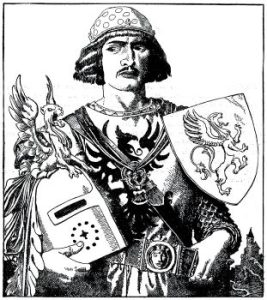
From wikipedia.org / oldbookart.com
The plot of Enemy of God hinged around three events and, similarly, that of Excalibur can be divided into three main episodes. Firstly, Merlin and Nimue attempt to summon back the old pagan gods and restore Britain to its former greatness. This involves using the 13 ‘Treasures of Britain’ that they spent the previous two books retrieving – the Treasures include Arthur’s sword Excalibur – in an elaborate ceremony. It also involves setting the summit of a hill called Mai Dun spectacularly on fire at Samain, the pagan predecessor to Halloween. Secondly, the Britons engage in a long, desperate struggle against Aelle and Cerdic, whose allied forces have launched an assault on Dumnonia. And lastly, there’s the final reckoning with the armies of Mordred and Nimue. Mordred is intent on killing Arthur and his young son Gwydre, who has a claim on Dumnonia’s throne. Nimue is intent on reclaiming Excalibur as a Treasure of Britain and making another attempt to bring back the ancient gods.
Enemy of God painted Christianity in a negative light – it concluded with a bloody revolt against Arthur by the Christians of Dumnonia, which Lancelot had fomented. But in Excalibur the pagans come off badly too. The ceremony that Merlin conducts on Mai Dun to summon the gods reveals a dark and hitherto-unseen side to his nature. And by the book’s end, Nimue, who early in the trilogy had been portrayed as a heroine and even as a possible love-interest for Derfel, has degenerated into a crazed and bloodthirsty monster.
Regarding the magical powers that Merlin, Nimue, the other druids and the Saxons’ wizards claim to have, Cornwell continues the policy he established in the first two books – he keeps it ambiguous. The people of the time certainly believe in it. Magic is as much a part of life for them as warfare, court intrigue and the weather. Modern-day readers are allowed to read between the lines and interpret some of that magic as fakery – its practitioners have no qualms about resorting to crafty conjuring tricks. The rest of it can be attributed to coincidence. However, in Excalibur, you’re forced to explain a lot of allegedly magic-inspired happenings – dream-prophecies, curses, enchantments – as coincidences. You begin to wonder if, in the world Cornwell has created here, there might be substance in what Merlin and Nimue claim they can do.
Elsewhere, Cornwell’s description of fifth-and-sixth-century fighting is as gripping as ever. It’s maybe even more gripping than in Excalibur’s two predecessors. The central episode, wherein we get a Saxon invasion, a desperate flight and then a siege, and finally the Battle of Mynydd Baddon and its aftermath, lasts a good 140 pages and is enthralling from start to finish. The climactic Battle of Camlann is on a much smaller scale but, because you know it’s Arthur’s last stand, it feels no less intense.
And despite the sadness that increasingly permeates the book, things are still leavened by humour. Merlin, as ever, gets the wittiest lines. Early on, he says about Arthur: “…he is a halfwit. Think about it! Lancelot alive, Mordred alive, Cerdic alive and Guinevere alive! If a soul wants to live forever in this world it seems like a very good idea to become an enemy of Arthur.”
So, that’s Bernard Cornwell’s Warlord trilogy over for me. At least I can console myself with the thought that there’s plenty of books by him I’ve still to read: two dozen Sharpe novels (1981-2025); the Grail Quest quartet (2000-2012), which sounds Arthurian but actually takes place during the Hundred Years’ War; 13 instalments of the Saxon Stories (2004-2020), set in ninth-and-tenth-century England; and four instalments of the Starbuck series (1993-96), set during the American Civil War. Yes, there’s enough Cornwell goodness out there to keep me reading for a long time to come.


